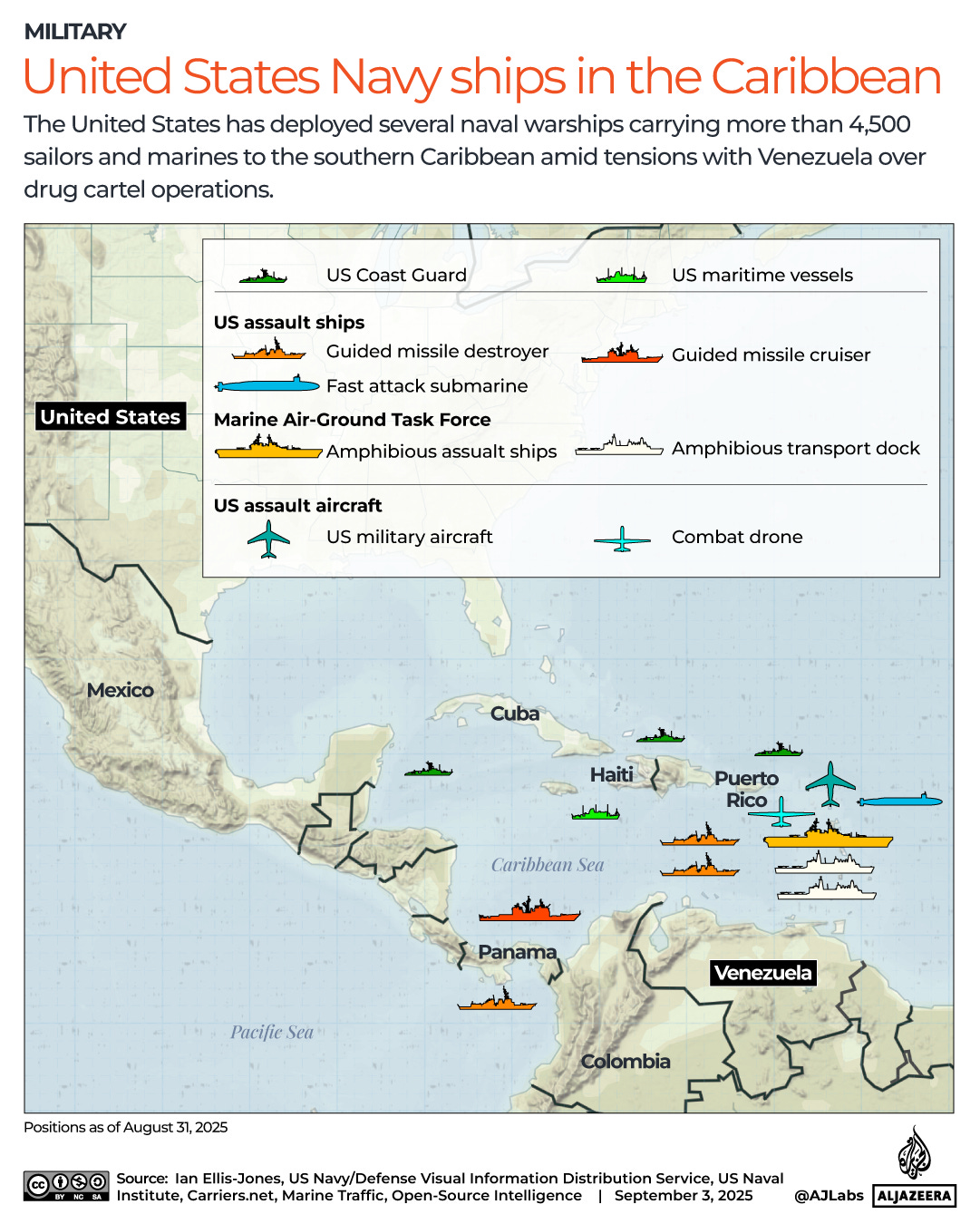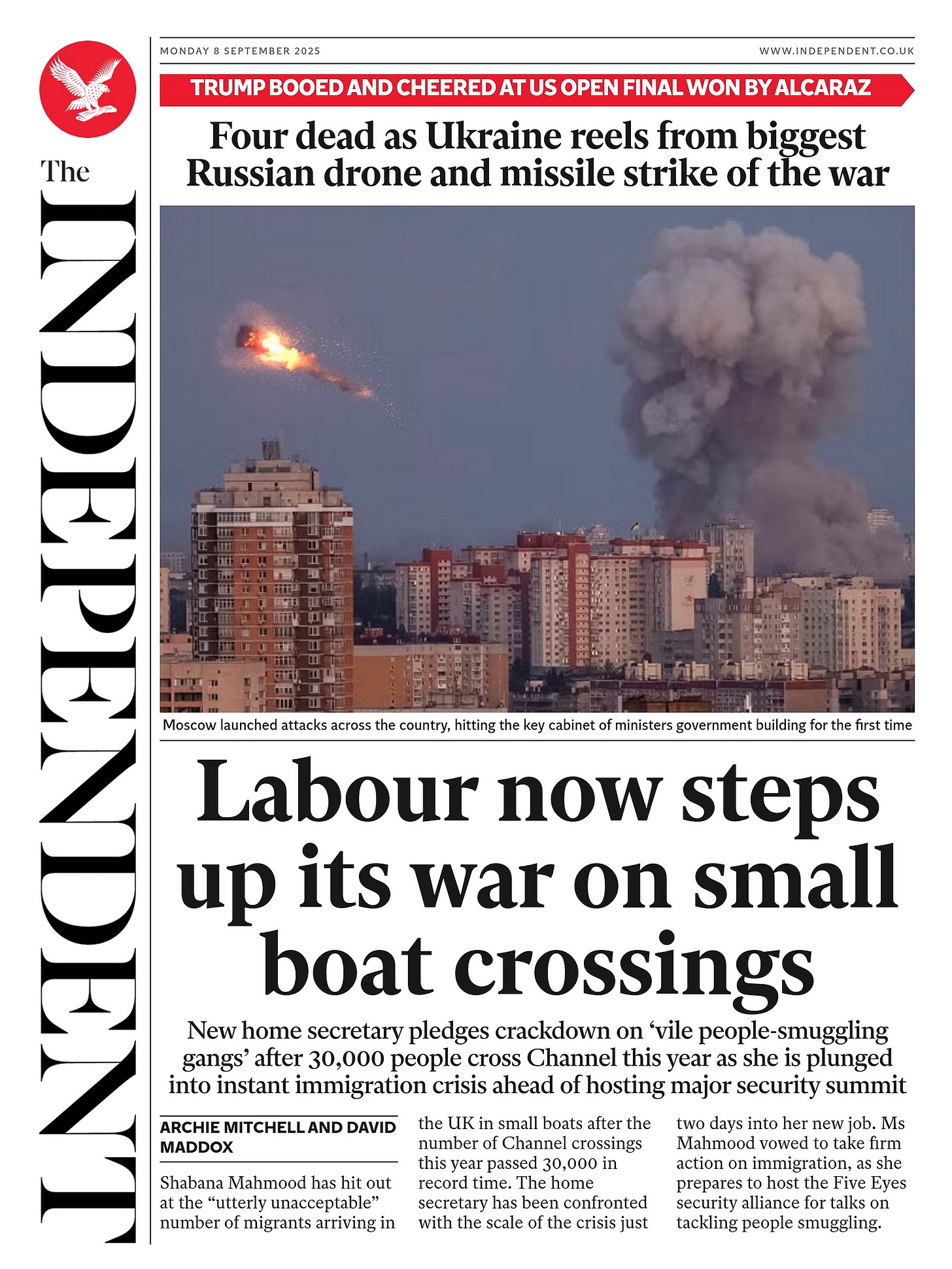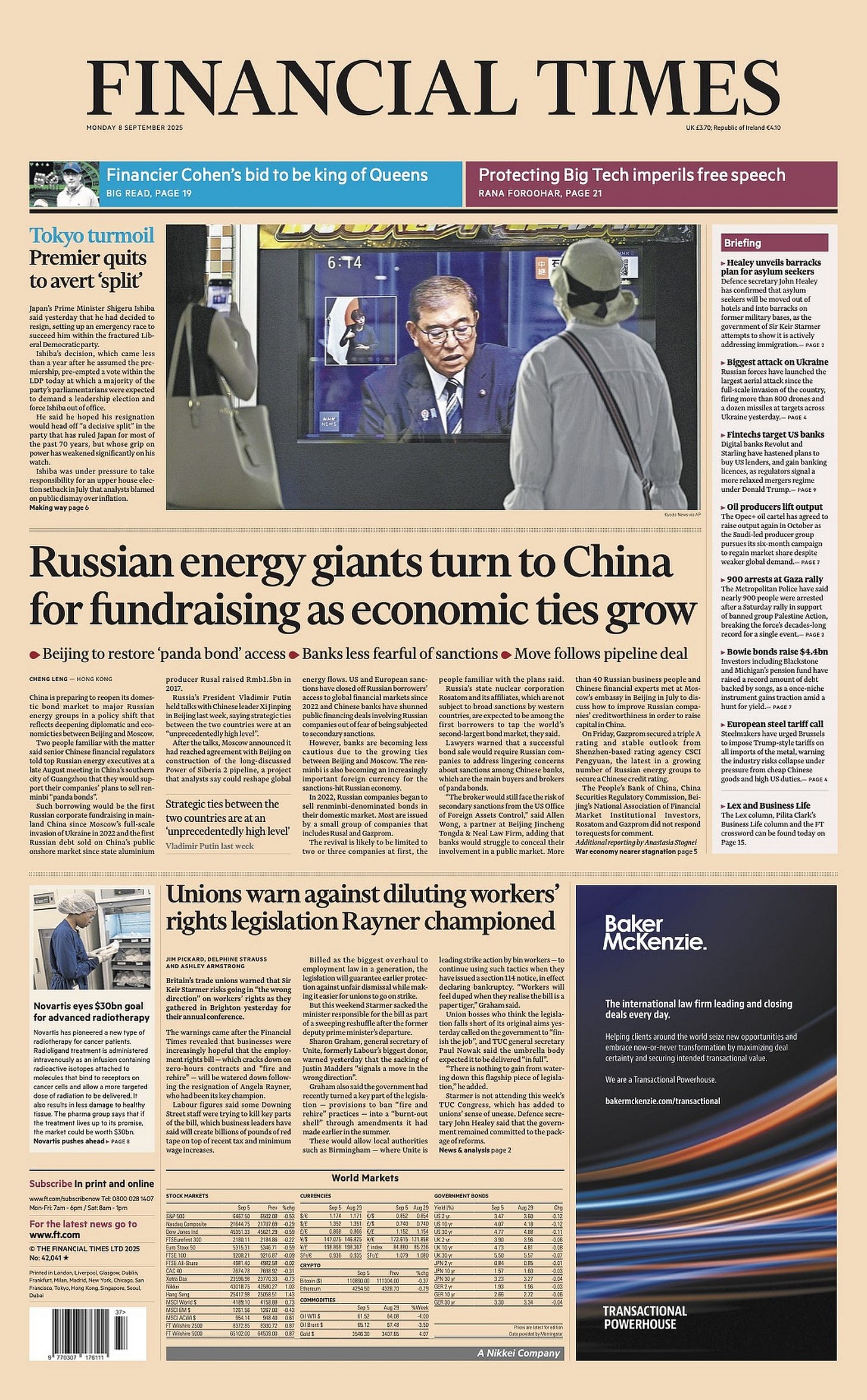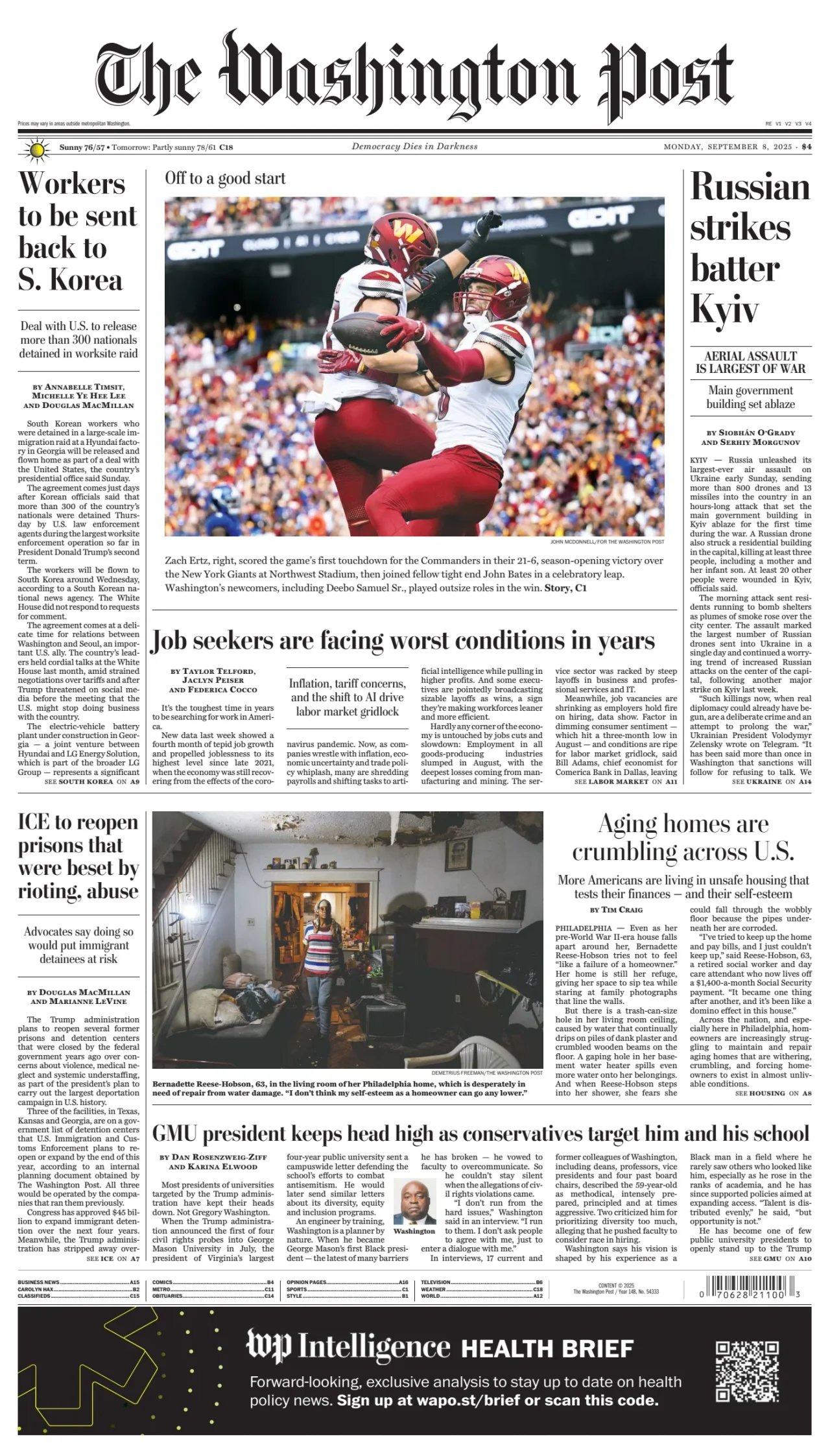Like Mounties Shooting a Canoe with a Cannon: U.S. Flexes Muscle in the Caribbean but Unlikely to Dent Drug Smugglers
A massive U.S. military deployment near Venezuela raises more questions than answers — from misfired drug interdictions to Maduro, oil politics, and phantom tankers.
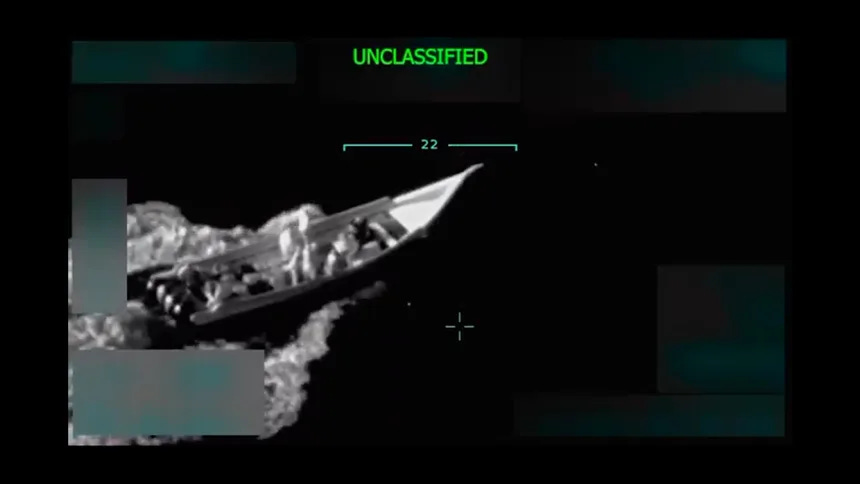
The United States has quietly but dramatically deployed nearly 7,000 military personnel, along with warships, aircraft, and support equipment, to the Caribbean and Latin America. The buildup, concentrated in waters closer to Venezuela, is raising eyebrows in the region — and concern in diplomatic circles.
The White House insists the show of force is linked to counter-narcotics operations. Officials point to the recent sinking of a high-speed vessel, allegedly carrying drugs out of Venezuela. But as I told CBS News this afternoon, the details don’t add up. A senior Colombian diplomat told me that with nine people on board, the boat looked far more like a migrant craft than a narco-trafficking vessel. After all, drug smugglers prize every inch and every kilogram of payload — they don’t fill their boats with passengers.
Adding to the mystery: it is the Pacific - not the Caribbean or Atlantic, where the U.S. naval forces are - which is the main maritime route for drug smugglers, according to UN Office of Drugs and Crime. If this were truly about stemming the tide of narcotics, the deployment looks oddly placed.
That’s why the U.S. action is being seen by many in the region as an “exaggerated use of force” — like the Canadian Mounties using a cannon to stop a canoe. Symbolic, dramatic, but unlikely to dent the transnational drug trade. Colombia and Guatemala, not Venezuela, remain the main source and transit countries for cocaine flows north.
So what explains the surge of American military might? Analysts and diplomats point to a convergence of factors:
Drug Interdiction & Muscle Flexing
Washington wants to show it is serious about stopping the flows of narcotics, even if the operational impact is limited. The optics of U.S. warships on the horizon play well domestically.A Warning to Maduro
The Trump administration could be signaling to Venezuela’s strongman that his time is running out. Regional powers, especially Colombia, would quietly welcome such pressure.Energy Geopolitics
Beneath the surface lies Venezuela’s vast oil wealth — among the largest reserves in the world. Despite sanctions, the U.S. has carved out exemptions for Chevron to resume some shipments, since Venezuelan crude is uniquely suited for American refineries. At the same time, Venezuela has managed to skirt sanctions by selling surging volumes of oil to Asia — especially China — through “zombie boats” and phantom ships, with barrels often rebranded as Brazilian. The Caribbean buildup, then, looks like a lot of show — but it’s still unclear what the true endgame is.
The irony is that Trump came to power promising to end wars, not start them. Yet here we see a major force positioned in a volatile region, with little clarity on its mission or its duration.
And one more thing often overlooked in the American debate: as Colombian youth once told me, “Why punish source countries when the problem is demand in the U.S.?” Without American consumers, there would be no need for traffickers, no incentive for smugglers, no reason for thousands of men and women to risk their lives at sea.
That’s the uncomfortable truth Washington has yet to confront.
Palestinian gunmen opened fire at a bus stop in north Jerusalem on Monday, killing six people and wounding several others, according to officials. The bus stop is at the busy Ramot Junction on Yigal Street, which leads to East Jerusalem. Israeli emergency service Magen David Adom (MDA) said five people were killed in the shooting attack, but Israeli Foreign Minister Gideon Saar, speaking later during a visit to Hungary, said six people were killed and that a pregnant woman was among those wounded. Police said two gunmen were also killed. The MDA said earlier that seven other people were left in serious condition, but it was unclear if that number had changed as the death toll climbed from an initial four to the six announced by Saar. Video from the scene showed dozens of people fleeing the sound of gunfire, running past stationary cars at the crowded intersection. Israeli media reported that the attackers boarded a bus full of passengers and opened fire. Prime Minister Benjamin Netanyahu, who visited the scene of the attack on Monday, was holding a meeting to assess the situation after the shooting, his office said. The shooting was one of the deadliest incidents of its kind since the war in Gaza was sparked by the Hamas-orchestrated Oct. 7, 2023 terrorist attack on Israel, which resulted in the deaths of more than 1,200 people, mostly civilians, according to Israeli officials. Hamas and its allies also seized 251 Israelis as hostages during the attack, about 50 of whom remain in Gaza, and 20 of whom are still believed to be alive according to Netanyahu - CBS News
The Israeli PM warned residents of Gaza City to leave now, hours after Israel said it would ramp up air strikes on the enclave. “I say to the residents of Gaza, I take this opportunity and listen to me carefully: you have been warned — leave now!” he said. Netanyahu said forces are now organising and assembling in Gaza City for a ground “manoeuvre”. Israel is in the midst of a globally condemned operation to seize Gaza City and forcibly displace all of its residents south - Al Jazeera
France’s parliament voted to topple the government of Prime Minister François Bayrou on Monday after the PM surprised even his own allies by calling a confidence vote to resolve a months-long deadlock over his austerity budget. He is the first premier in the history of modern France to be ousted in a confidence vote rather than a no-confidence vote, will submit his resignation on Tuesday morning, according to a person close to him who asked not to be named. In the vote in the National Assembly, 364 deputies voted that they had no confidence in the government while just 194 gave it their confidence. Bayrou, who has been in the job for just nine months, had blindsided even his allies by calling a confidence vote to end a lengthy standoff over his austerity budget, which foresees almost 44 billion euros of cost savings to reduce France's debt pile. Bayrou is the sixth prime minister under Macron since his 2017 election but the fifth since 2022. The Élysée Palace said that President Emmanuel Macron had "taken note" of the National Assembly's decision to overturn the government of Bayrou, saying that a new prime minister would be named "in the next few days" - France 24
BRICS countries meet virtually today to discuss the impact of US tariffs, yet another sign of shifting global trade alliances in response to Washington’s deepening protectionism. The meeting of the bloc of mostly developing nations comes as South Korea mulls joining the CPTPP, a pan-Pacific free trade group, while European officials head to New Delhi for talks on deepening economic ties and India looks to tighten technological cooperation with Singapore. New data, meanwhile, showed that Chinese exports to the US plummeted again, but sales elsewhere surged. “The rest of the world has mostly continued to trade on normal terms,” Ngozi Okonjo-Iweala, the director-general of the World Trade Organization, wrote in the Financial Times. “The system is showing resilience.” - Semafor
The U.S. Supreme Court on Monday blocked a federal judge's ruling that restricted federal officers’ ability to conduct immigration stops in the Los Angeles area, prompting a harsh rebuke from liberal Justice Sonia Sotomayor. The decision to grant an emergency request filed by the Trump administration puts on hold the July 11 ruling by Los Angeles-based U.S. District Judge Maame Ewusi-Mensah Frimpong. Attorney General Pam Bondi welcomed the decision, saying in an X post that it means immigration enforcement agents "can continue carrying out roving patrols in California without judicial micromanagement." Sotomayor, the first Hispanic to serve on the court, was joined in dissent by the court's two other liberals - NBC News
“We should not have to live in a country where the Government can seize anyone who looks Latino, speaks Spanish, and appears to work a low wage job. Rather than stand idly by while our constitutional freedoms are lost, I dissent” - Justice Sonia Sotomayor.
US President Donald Trump threatened Russia with new sanctions after Moscow launched the heaviest aerial assault of the war so far. Sunday’s strikes involved 823 drones and missiles and killed four people, including a mother and baby. Trump has repeatedly talked tough on Russia, but has not always followed through, so European capitals will be watching. “I’ll believe it when I see it,” one diplomat told Politico. The European Union is optimistic, with the bloc’s president saying it had “turned the page” on its rocky relationship with Trump. The US energy secretary is coming to Brussels to discuss new sanctions with EU officials, and the meetings will be a big test of Washington’s commitment to Ukraine, the Financial Times reported.
European leaders will visit the United States this week to discuss how to end the war in Ukraine, US President Donald Trump said on September 7 after Russia pounded the Ukrainian capital with a new major drone strike. Trump, who did not specify which European leaders would travel to the US, also said he would speak to Russian President Vladimir Putin soon and expressed confidence that his efforts to end the war would be successful. “We’re going to get it done -- the Russia Ukraine situation -- we are going to get it done. I have confidence we are going to get it done,” Trump told reporters after returning to Washington from the US Open tennis tournament in New York City. Trump again said that he is "very disappointed" in Putin and said both he and first lady Melania Trump were "disappointed that this ridiculous war continues" as his efforts to convince Russia and Ukraine to agree to hold talks to end the war falter. He has previously set ultimatums and deadlines, including the threat of further sanctions, if Russia won’t strike a peace deal - RFE/RL
Police in Nepal's capital city of Kathmandu opened fire Monday on protesters demonstrating against a government ban on social media platforms, killing at least 14 and wounding dozens more, according to state TV. At least six people died at the Bir Hospital in Kathmandu, the Kantipur newspaper said, quoting doctors. Two died at the Civil Hospital and two more at the KMC hospital, according to doctors there who spoke on condition of anonymity because they were not authorized to comment. The wounded were being treated at half of a dozen hospitals in Kathmandu. Tens of thousands of protesters took to the streets of Nepal's capital Monday to vent their anger against a decision by authorities to block most social media platforms, including Facebook, X and YouTube. Authorities have accused the platforms of failing to register and submit to government oversight. Protesters pushed through barbed wire and forced riot police to retreat as they surrounded the Nepalese Parliament building. Police fired tear gas and water cannon but were outnumbered and sought safety inside the parliament complex. Police eventually opened fire at the protesters. Nepal's government communications minister Prithvi Subba told CBS News' partner network BBC News that police were compelled to use force. “Tear gas and water cannons were used after the protesters breached into the restricted area," police spokesperson Shekhar Khanal told the AFP news agency. The situation remained tense and the government announced a curfew for Monday around the parliament, along with the government secretariat, presidential house and other key parts of the city - CBS News
Donald Trump endured another confusing senior moment when he said he had “just left” the Middle East—having actually last visited four months ago. “Leaders from all over the world that talked to me… I just left the Middle East—King of Saudi Arabia, Qatar, UAE… Then I was with the heads of NATO,” Trump, 79, boasted during an address to the White House Religious Liberty Commission at the Museum of the Bible on Monday, in a clip posted by journalist Aaron Rupar to Bluesky. However, the president’s Middle East tour—Saudi Arabia, Qatar, and the UAE—actually took place back in mid-May. He then met “the heads of NATO” at the Hague summit on June 24–25. Trump’s embarrassing slips are becoming a pattern documented by the Daily Beast over the past few months. The president has forgotten the name of the ocean he meant on Fox & Friends, blanked on a “big” war he says he ended, failed to spot Finland’s president sitting directly opposite him, and misnamed DHS Secretary Kristi Noem as golfer Cristie Kerr, among others - Daily Beast


